Organisational Behaviour in Sainsbury's: A Comprehensive Report
VerifiedAdded on 2023/01/12
|15
|1653
|88
Report
AI Summary
This report provides a detailed analysis of organisational behaviour within Sainsbury's, a major UK supermarket chain. It explores key concepts such as organisational culture, including power, task, person, and role cultures, and how these impact employee performance. The report delves into the role of politics in the workplace, its demotivating effects, and its impact on productivity and the overall work environment. It examines different types of power, including legitimate, reward, referent, informational, and expert power, and their application in motivating employees. The report further investigates motivation theories, including intrinsic and extrinsic motivation, Maslow's Hierarchy of Needs, and Vroom's Expectancy Theory, illustrating how these theories are relevant to Sainsbury's. It also discusses effective and ineffective teams, the Tuckman model of team development, and the Path-Goal Theory of leadership, concluding with recommendations for fostering a positive and productive work environment at Sainsbury's. This report aims to provide a comprehensive understanding of how organisational behaviour principles can be applied to improve employee engagement and organisational success at Sainsbury's.
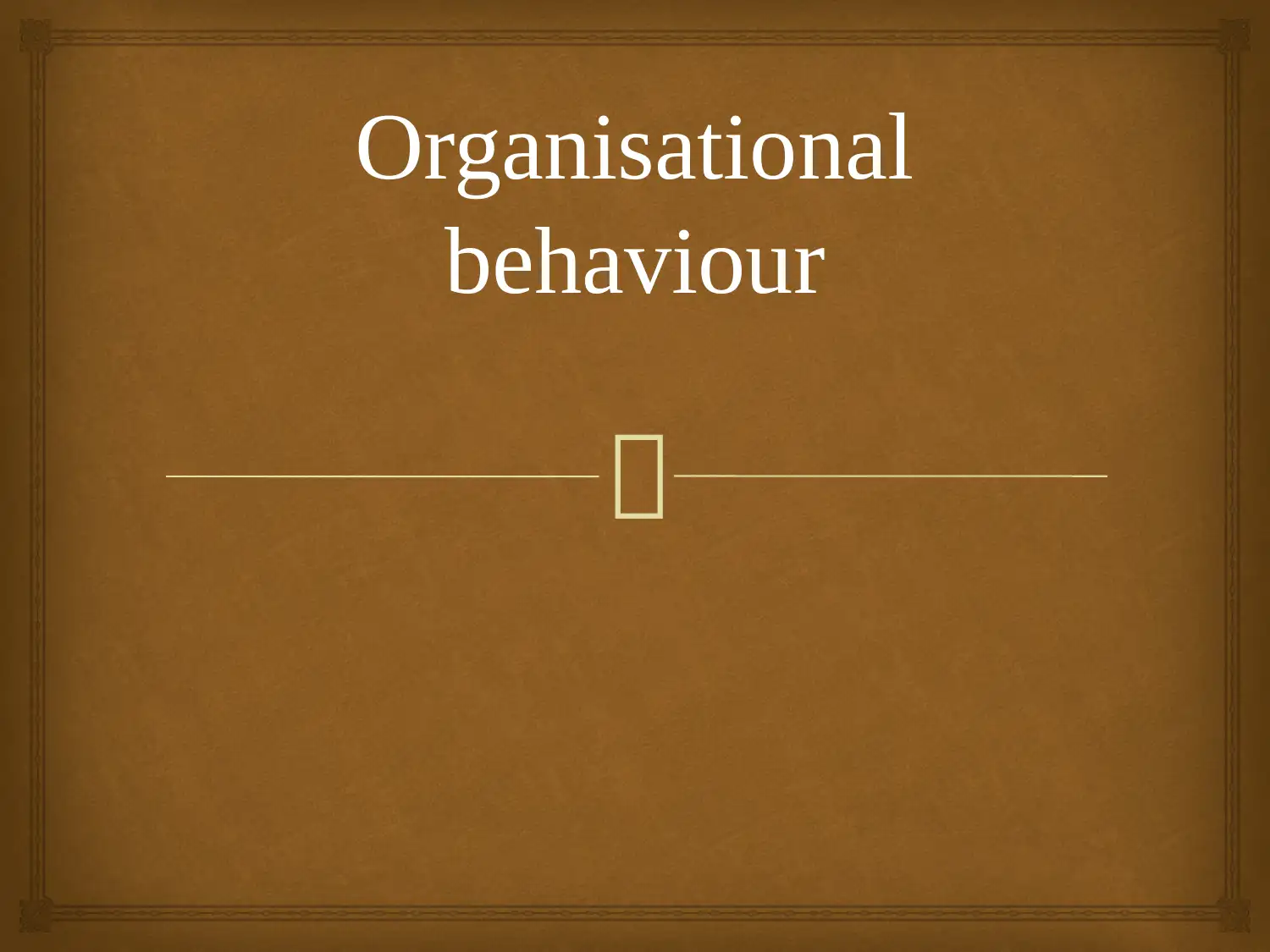
Organisational
behaviour
Organisational
behaviour
Paraphrase This Document
Need a fresh take? Get an instant paraphrase of this document with our AI Paraphraser
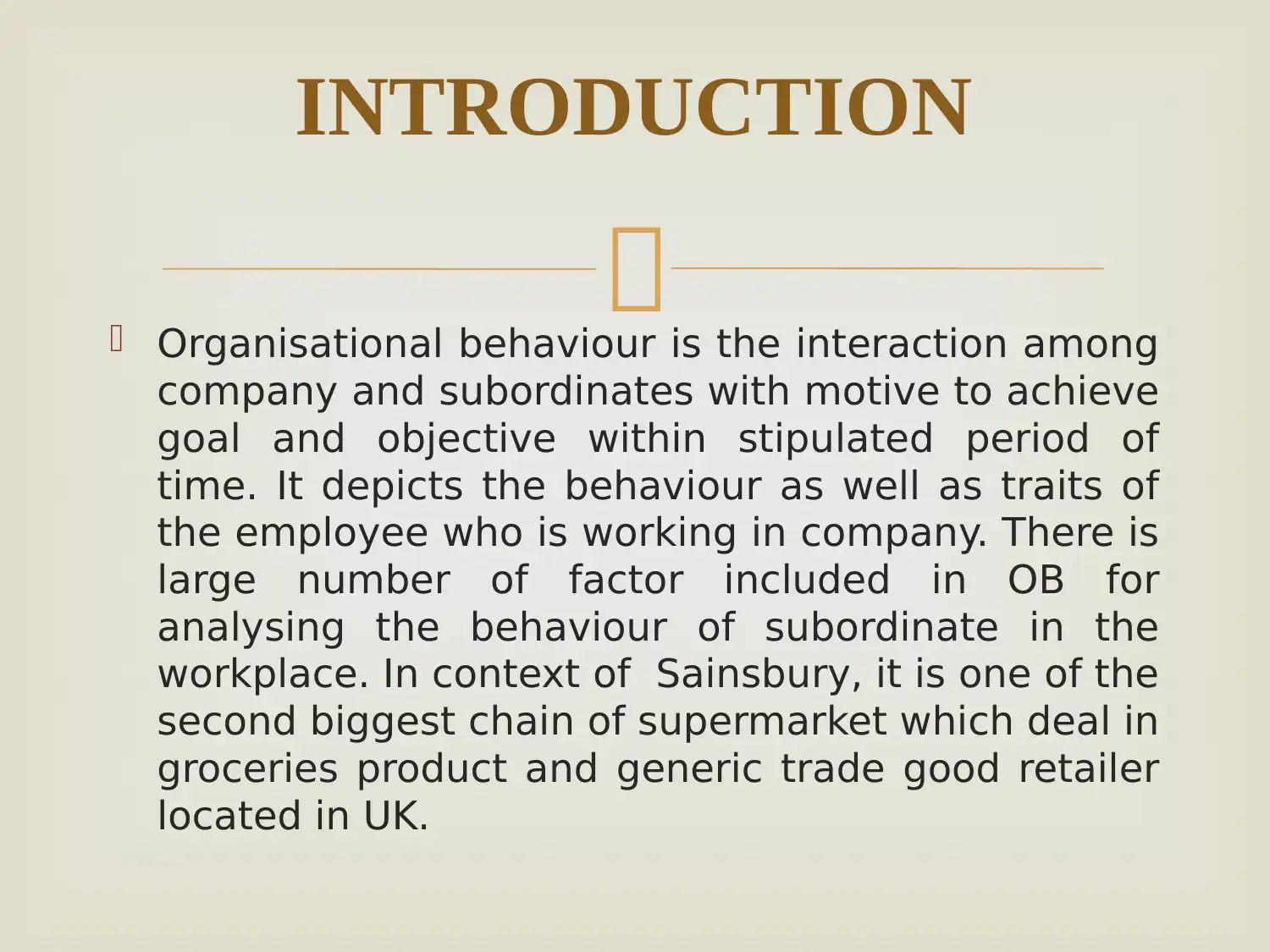
Organisational behaviour is the interaction among
company and subordinates with motive to achieve
goal and objective within stipulated period of
time. It depicts the behaviour as well as traits of
the employee who is working in company. There is
large number of factor included in OB for
analysing the behaviour of subordinate in the
workplace. In context of Sainsbury, it is one of the
second biggest chain of supermarket which deal in
groceries product and generic trade good retailer
located in UK.
INTRODUCTION
Organisational behaviour is the interaction among
company and subordinates with motive to achieve
goal and objective within stipulated period of
time. It depicts the behaviour as well as traits of
the employee who is working in company. There is
large number of factor included in OB for
analysing the behaviour of subordinate in the
workplace. In context of Sainsbury, it is one of the
second biggest chain of supermarket which deal in
groceries product and generic trade good retailer
located in UK.
INTRODUCTION
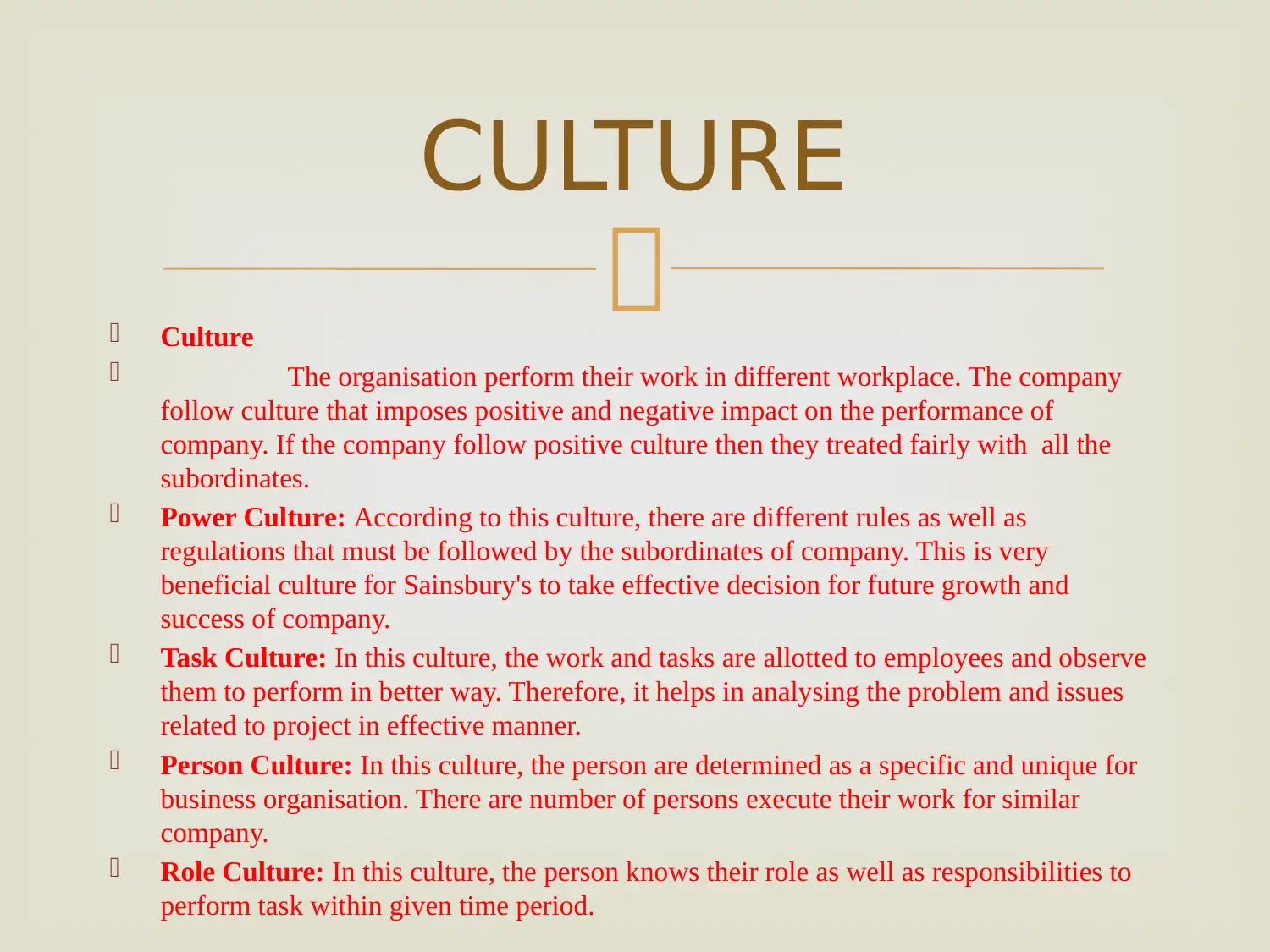
Culture
The organisation perform their work in different workplace. The company
follow culture that imposes positive and negative impact on the performance of
company. If the company follow positive culture then they treated fairly with all the
subordinates.
Power Culture: According to this culture, there are different rules as well as
regulations that must be followed by the subordinates of company. This is very
beneficial culture for Sainsbury's to take effective decision for future growth and
success of company.
Task Culture: In this culture, the work and tasks are allotted to employees and observe
them to perform in better way. Therefore, it helps in analysing the problem and issues
related to project in effective manner.
Person Culture: In this culture, the person are determined as a specific and unique for
business organisation. There are number of persons execute their work for similar
company.
Role Culture: In this culture, the person knows their role as well as responsibilities to
perform task within given time period.
CULTURE
The organisation perform their work in different workplace. The company
follow culture that imposes positive and negative impact on the performance of
company. If the company follow positive culture then they treated fairly with all the
subordinates.
Power Culture: According to this culture, there are different rules as well as
regulations that must be followed by the subordinates of company. This is very
beneficial culture for Sainsbury's to take effective decision for future growth and
success of company.
Task Culture: In this culture, the work and tasks are allotted to employees and observe
them to perform in better way. Therefore, it helps in analysing the problem and issues
related to project in effective manner.
Person Culture: In this culture, the person are determined as a specific and unique for
business organisation. There are number of persons execute their work for similar
company.
Role Culture: In this culture, the person knows their role as well as responsibilities to
perform task within given time period.
CULTURE
⊘ This is a preview!⊘
Do you want full access?
Subscribe today to unlock all pages.

Trusted by 1+ million students worldwide
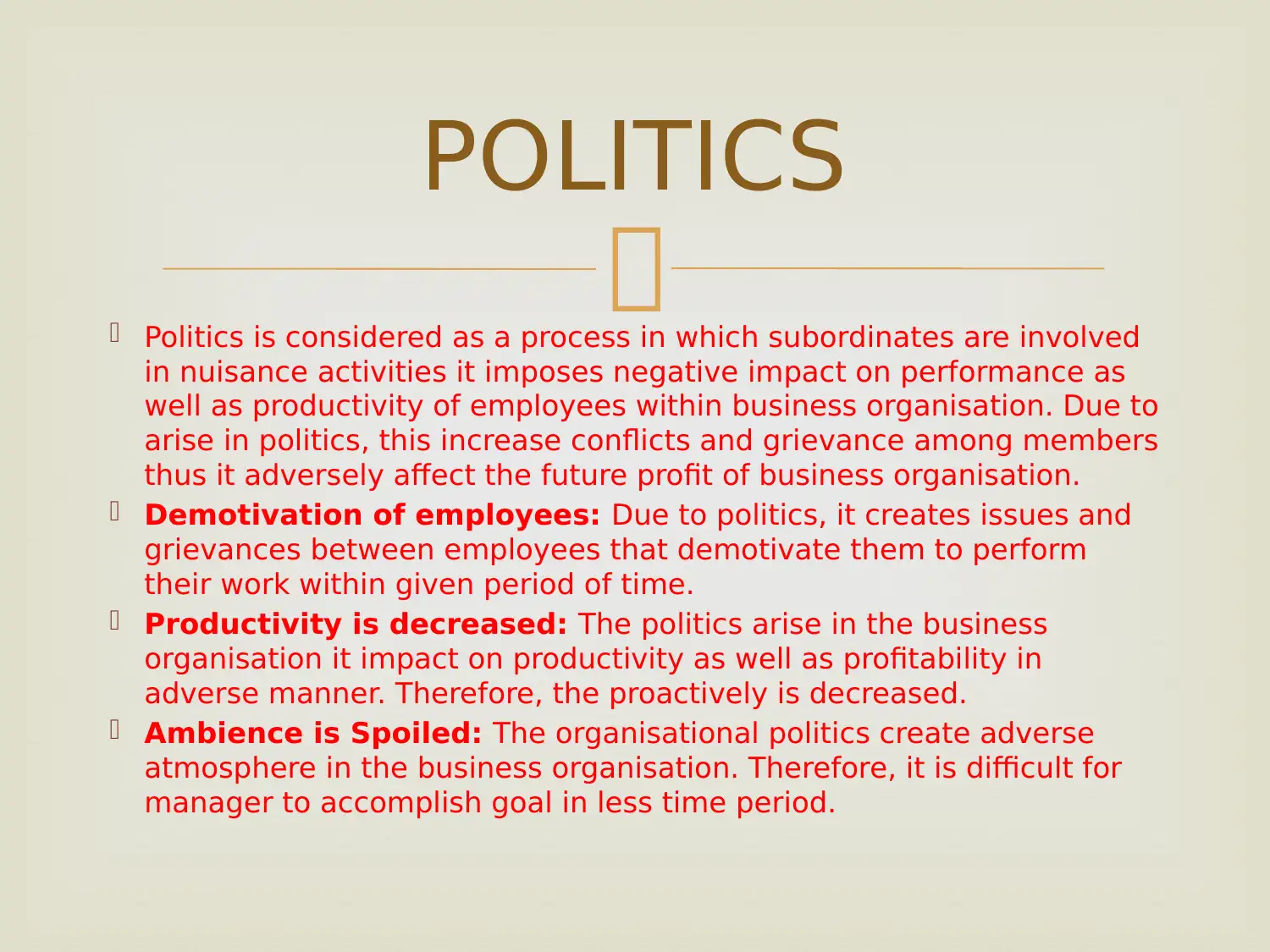
Politics is considered as a process in which subordinates are involved
in nuisance activities it imposes negative impact on performance as
well as productivity of employees within business organisation. Due to
arise in politics, this increase conflicts and grievance among members
thus it adversely affect the future profit of business organisation.
Demotivation of employees: Due to politics, it creates issues and
grievances between employees that demotivate them to perform
their work within given period of time.
Productivity is decreased: The politics arise in the business
organisation it impact on productivity as well as profitability in
adverse manner. Therefore, the proactively is decreased.
Ambience is Spoiled: The organisational politics create adverse
atmosphere in the business organisation. Therefore, it is difficult for
manager to accomplish goal in less time period.
POLITICS
Politics is considered as a process in which subordinates are involved
in nuisance activities it imposes negative impact on performance as
well as productivity of employees within business organisation. Due to
arise in politics, this increase conflicts and grievance among members
thus it adversely affect the future profit of business organisation.
Demotivation of employees: Due to politics, it creates issues and
grievances between employees that demotivate them to perform
their work within given period of time.
Productivity is decreased: The politics arise in the business
organisation it impact on productivity as well as profitability in
adverse manner. Therefore, the proactively is decreased.
Ambience is Spoiled: The organisational politics create adverse
atmosphere in the business organisation. Therefore, it is difficult for
manager to accomplish goal in less time period.
POLITICS
Paraphrase This Document
Need a fresh take? Get an instant paraphrase of this document with our AI Paraphraser
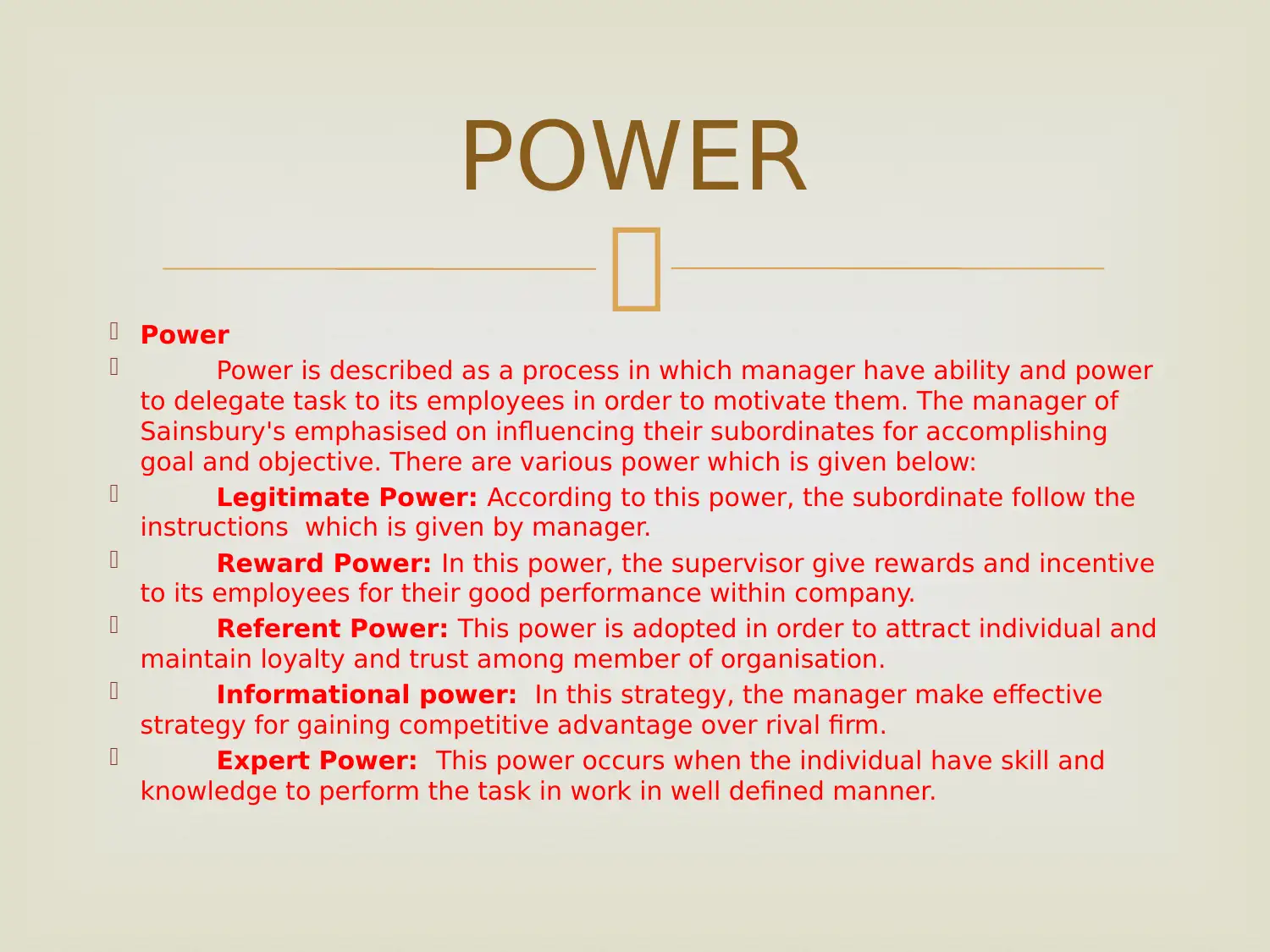
Power
Power is described as a process in which manager have ability and power
to delegate task to its employees in order to motivate them. The manager of
Sainsbury's emphasised on influencing their subordinates for accomplishing
goal and objective. There are various power which is given below:
Legitimate Power: According to this power, the subordinate follow the
instructions which is given by manager.
Reward Power: In this power, the supervisor give rewards and incentive
to its employees for their good performance within company.
Referent Power: This power is adopted in order to attract individual and
maintain loyalty and trust among member of organisation.
Informational power: In this strategy, the manager make effective
strategy for gaining competitive advantage over rival firm.
Expert Power: This power occurs when the individual have skill and
knowledge to perform the task in work in well defined manner.
POWER
Power is described as a process in which manager have ability and power
to delegate task to its employees in order to motivate them. The manager of
Sainsbury's emphasised on influencing their subordinates for accomplishing
goal and objective. There are various power which is given below:
Legitimate Power: According to this power, the subordinate follow the
instructions which is given by manager.
Reward Power: In this power, the supervisor give rewards and incentive
to its employees for their good performance within company.
Referent Power: This power is adopted in order to attract individual and
maintain loyalty and trust among member of organisation.
Informational power: In this strategy, the manager make effective
strategy for gaining competitive advantage over rival firm.
Expert Power: This power occurs when the individual have skill and
knowledge to perform the task in work in well defined manner.
POWER
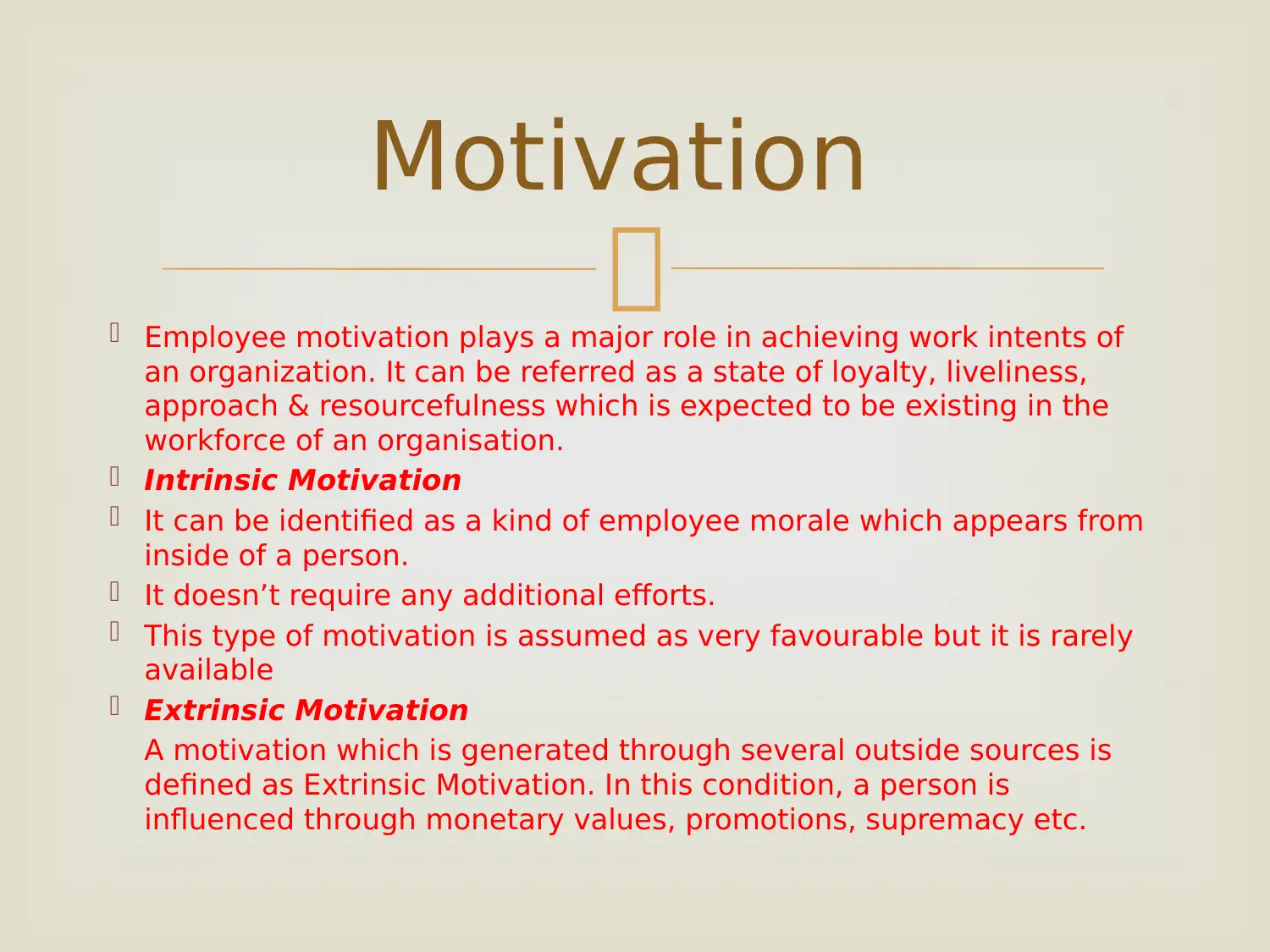
Employee motivation plays a major role in achieving work intents of
an organization. It can be referred as a state of loyalty, liveliness,
approach & resourcefulness which is expected to be existing in the
workforce of an organisation.
Intrinsic Motivation
It can be identified as a kind of employee morale which appears from
inside of a person.
It doesn’t require any additional efforts.
This type of motivation is assumed as very favourable but it is rarely
available
Extrinsic Motivation
A motivation which is generated through several outside sources is
defined as Extrinsic Motivation. In this condition, a person is
influenced through monetary values, promotions, supremacy etc.
Motivation
Employee motivation plays a major role in achieving work intents of
an organization. It can be referred as a state of loyalty, liveliness,
approach & resourcefulness which is expected to be existing in the
workforce of an organisation.
Intrinsic Motivation
It can be identified as a kind of employee morale which appears from
inside of a person.
It doesn’t require any additional efforts.
This type of motivation is assumed as very favourable but it is rarely
available
Extrinsic Motivation
A motivation which is generated through several outside sources is
defined as Extrinsic Motivation. In this condition, a person is
influenced through monetary values, promotions, supremacy etc.
Motivation
⊘ This is a preview!⊘
Do you want full access?
Subscribe today to unlock all pages.

Trusted by 1+ million students worldwide
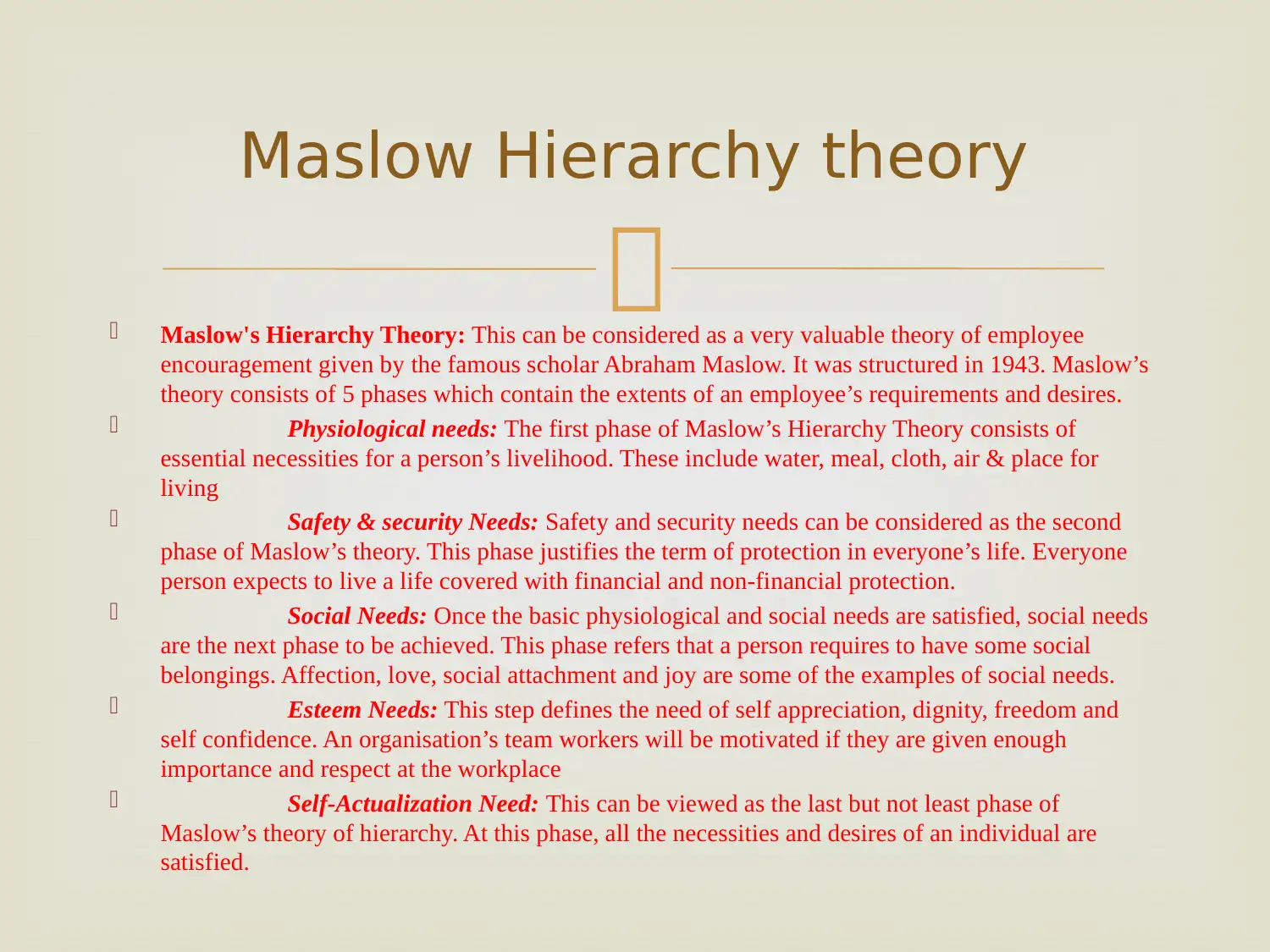
Maslow's Hierarchy Theory: This can be considered as a very valuable theory of employee
encouragement given by the famous scholar Abraham Maslow. It was structured in 1943. Maslow’s
theory consists of 5 phases which contain the extents of an employee’s requirements and desires.
Physiological needs: The first phase of Maslow’s Hierarchy Theory consists of
essential necessities for a person’s livelihood. These include water, meal, cloth, air & place for
living
Safety & security Needs: Safety and security needs can be considered as the second
phase of Maslow’s theory. This phase justifies the term of protection in everyone’s life. Everyone
person expects to live a life covered with financial and non-financial protection.
Social Needs: Once the basic physiological and social needs are satisfied, social needs
are the next phase to be achieved. This phase refers that a person requires to have some social
belongings. Affection, love, social attachment and joy are some of the examples of social needs.
Esteem Needs: This step defines the need of self appreciation, dignity, freedom and
self confidence. An organisation’s team workers will be motivated if they are given enough
importance and respect at the workplace
Self-Actualization Need: This can be viewed as the last but not least phase of
Maslow’s theory of hierarchy. At this phase, all the necessities and desires of an individual are
satisfied.
Maslow Hierarchy theory
encouragement given by the famous scholar Abraham Maslow. It was structured in 1943. Maslow’s
theory consists of 5 phases which contain the extents of an employee’s requirements and desires.
Physiological needs: The first phase of Maslow’s Hierarchy Theory consists of
essential necessities for a person’s livelihood. These include water, meal, cloth, air & place for
living
Safety & security Needs: Safety and security needs can be considered as the second
phase of Maslow’s theory. This phase justifies the term of protection in everyone’s life. Everyone
person expects to live a life covered with financial and non-financial protection.
Social Needs: Once the basic physiological and social needs are satisfied, social needs
are the next phase to be achieved. This phase refers that a person requires to have some social
belongings. Affection, love, social attachment and joy are some of the examples of social needs.
Esteem Needs: This step defines the need of self appreciation, dignity, freedom and
self confidence. An organisation’s team workers will be motivated if they are given enough
importance and respect at the workplace
Self-Actualization Need: This can be viewed as the last but not least phase of
Maslow’s theory of hierarchy. At this phase, all the necessities and desires of an individual are
satisfied.
Maslow Hierarchy theory
Paraphrase This Document
Need a fresh take? Get an instant paraphrase of this document with our AI Paraphraser
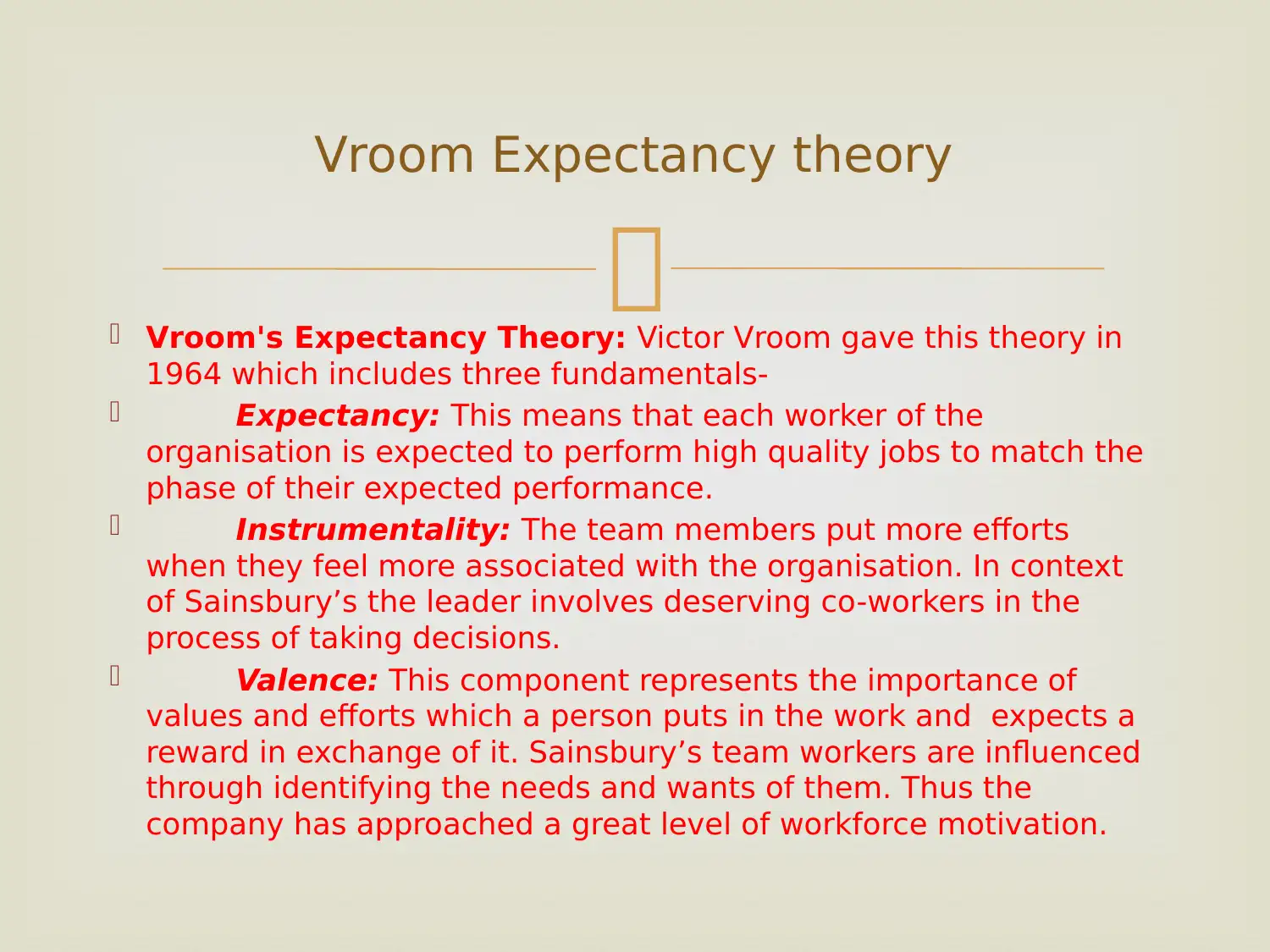
Vroom's Expectancy Theory: Victor Vroom gave this theory in
1964 which includes three fundamentals-
Expectancy: This means that each worker of the
organisation is expected to perform high quality jobs to match the
phase of their expected performance.
Instrumentality: The team members put more efforts
when they feel more associated with the organisation. In context
of Sainsbury’s the leader involves deserving co-workers in the
process of taking decisions.
Valence: This component represents the importance of
values and efforts which a person puts in the work and expects a
reward in exchange of it. Sainsbury’s team workers are influenced
through identifying the needs and wants of them. Thus the
company has approached a great level of workforce motivation.
Vroom Expectancy theory
Vroom's Expectancy Theory: Victor Vroom gave this theory in
1964 which includes three fundamentals-
Expectancy: This means that each worker of the
organisation is expected to perform high quality jobs to match the
phase of their expected performance.
Instrumentality: The team members put more efforts
when they feel more associated with the organisation. In context
of Sainsbury’s the leader involves deserving co-workers in the
process of taking decisions.
Valence: This component represents the importance of
values and efforts which a person puts in the work and expects a
reward in exchange of it. Sainsbury’s team workers are influenced
through identifying the needs and wants of them. Thus the
company has approached a great level of workforce motivation.
Vroom Expectancy theory
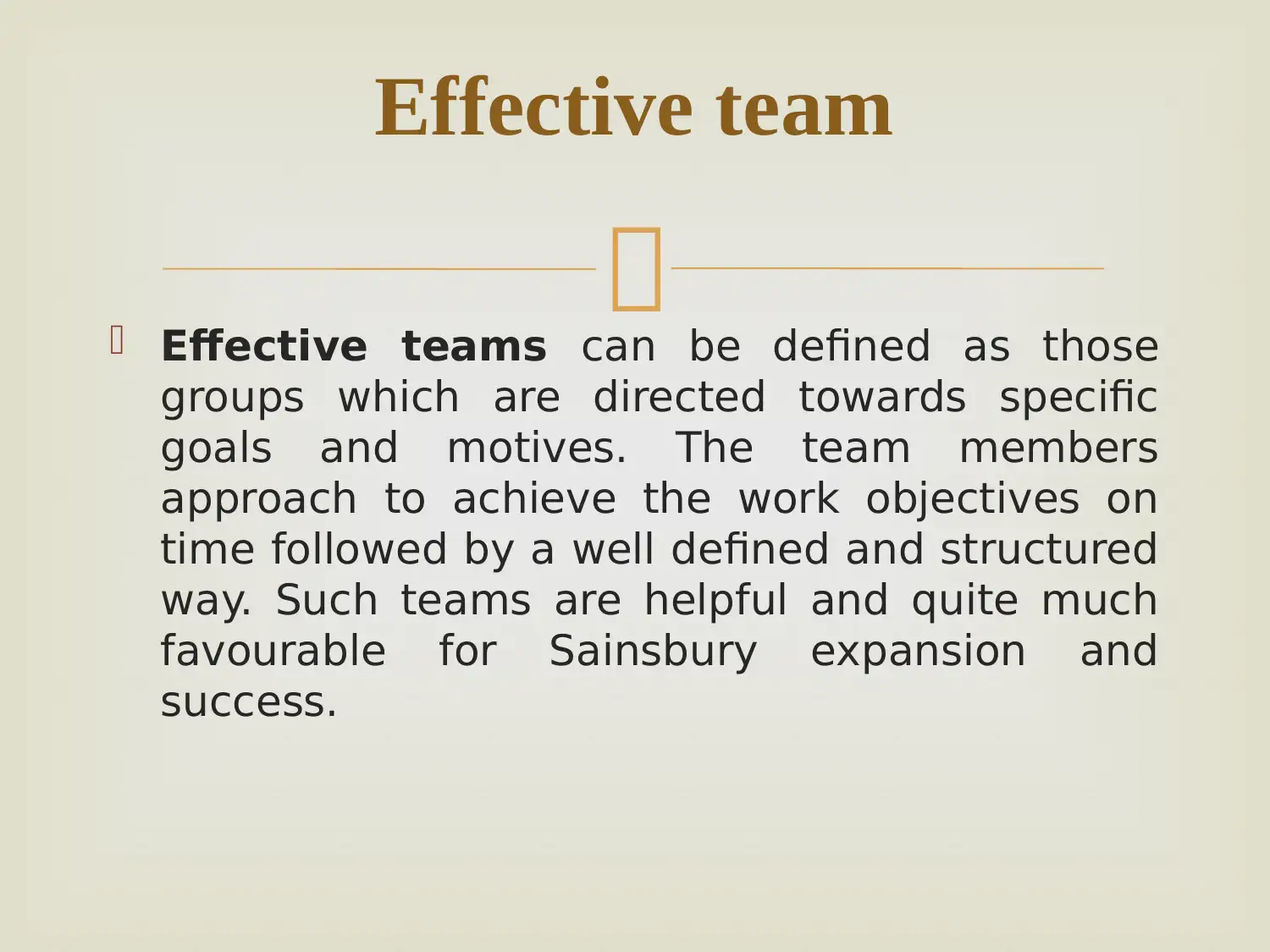
Effective teams can be defined as those
groups which are directed towards specific
goals and motives. The team members
approach to achieve the work objectives on
time followed by a well defined and structured
way. Such teams are helpful and quite much
favourable for Sainsbury expansion and
success.
Effective team
Effective teams can be defined as those
groups which are directed towards specific
goals and motives. The team members
approach to achieve the work objectives on
time followed by a well defined and structured
way. Such teams are helpful and quite much
favourable for Sainsbury expansion and
success.
Effective team
⊘ This is a preview!⊘
Do you want full access?
Subscribe today to unlock all pages.

Trusted by 1+ million students worldwide
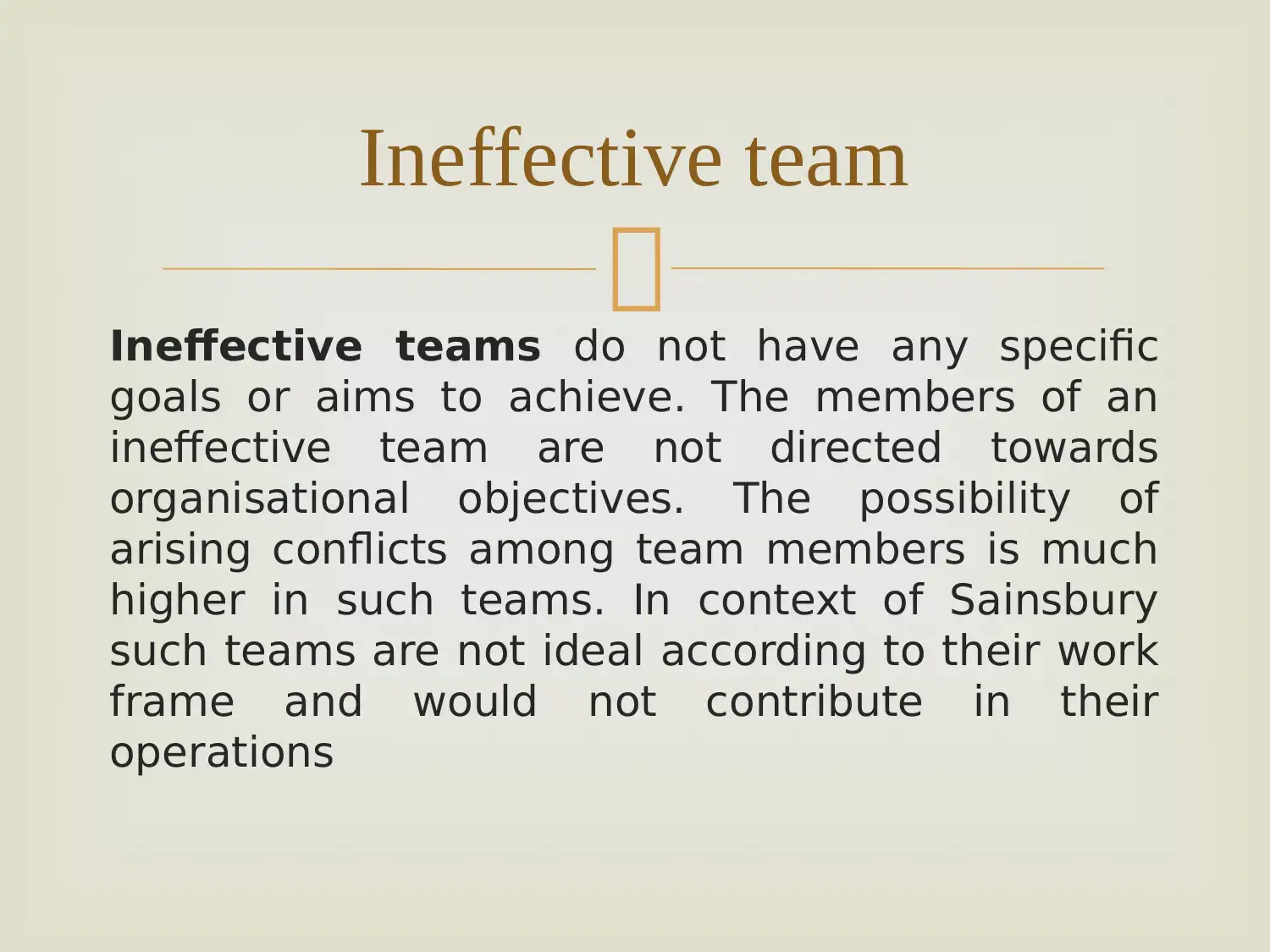
Ineffective teams do not have any specific
goals or aims to achieve. The members of an
ineffective team are not directed towards
organisational objectives. The possibility of
arising conflicts among team members is much
higher in such teams. In context of Sainsbury
such teams are not ideal according to their work
frame and would not contribute in their
operations
Ineffective team
Ineffective teams do not have any specific
goals or aims to achieve. The members of an
ineffective team are not directed towards
organisational objectives. The possibility of
arising conflicts among team members is much
higher in such teams. In context of Sainsbury
such teams are not ideal according to their work
frame and would not contribute in their
operations
Ineffective team
Paraphrase This Document
Need a fresh take? Get an instant paraphrase of this document with our AI Paraphraser
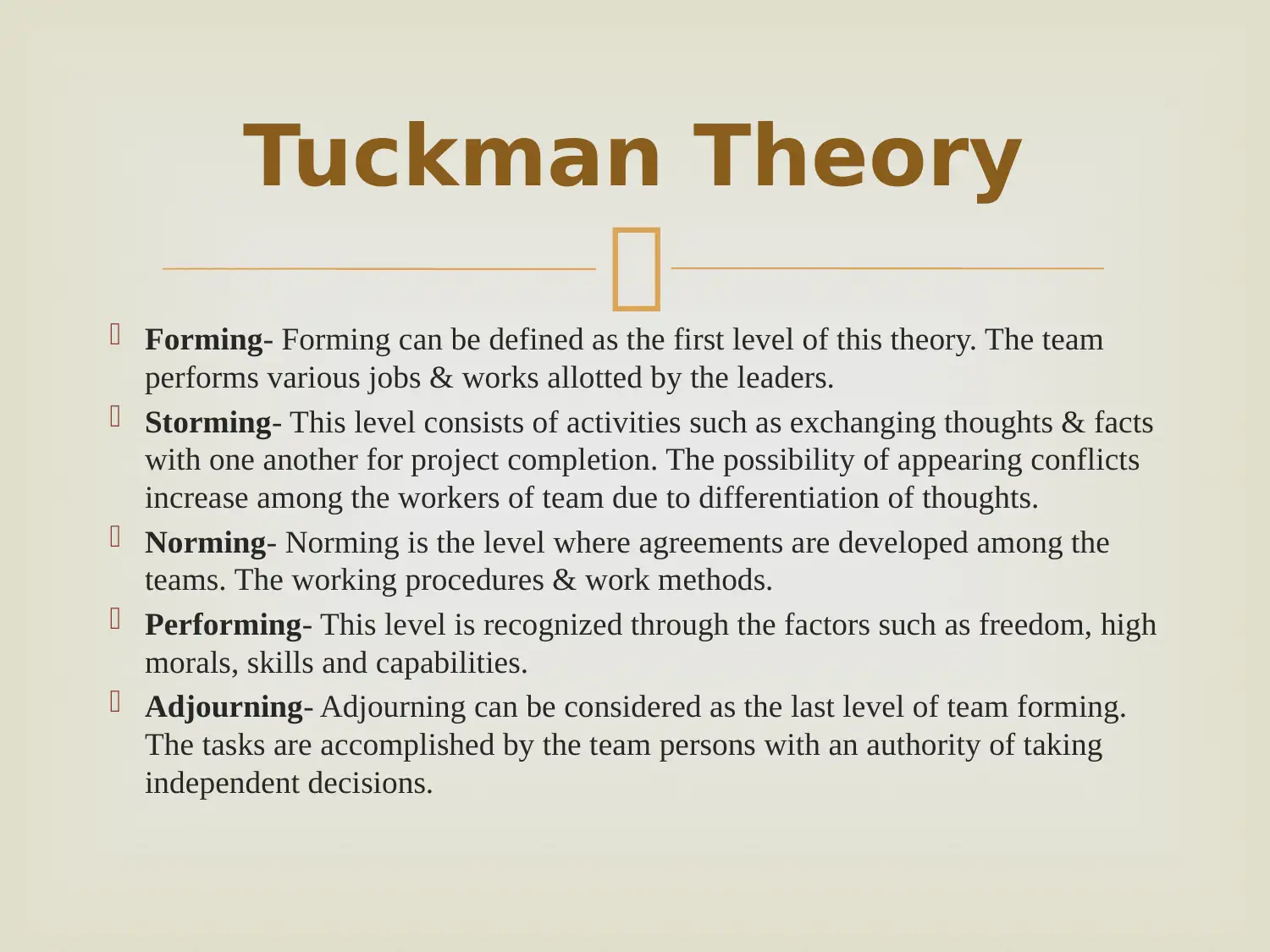
Forming- Forming can be defined as the first level of this theory. The team
performs various jobs & works allotted by the leaders.
Storming- This level consists of activities such as exchanging thoughts & facts
with one another for project completion. The possibility of appearing conflicts
increase among the workers of team due to differentiation of thoughts.
Norming- Norming is the level where agreements are developed among the
teams. The working procedures & work methods.
Performing- This level is recognized through the factors such as freedom, high
morals, skills and capabilities.
Adjourning- Adjourning can be considered as the last level of team forming.
The tasks are accomplished by the team persons with an authority of taking
independent decisions.
Tuckman Theory
Forming- Forming can be defined as the first level of this theory. The team
performs various jobs & works allotted by the leaders.
Storming- This level consists of activities such as exchanging thoughts & facts
with one another for project completion. The possibility of appearing conflicts
increase among the workers of team due to differentiation of thoughts.
Norming- Norming is the level where agreements are developed among the
teams. The working procedures & work methods.
Performing- This level is recognized through the factors such as freedom, high
morals, skills and capabilities.
Adjourning- Adjourning can be considered as the last level of team forming.
The tasks are accomplished by the team persons with an authority of taking
independent decisions.
Tuckman Theory
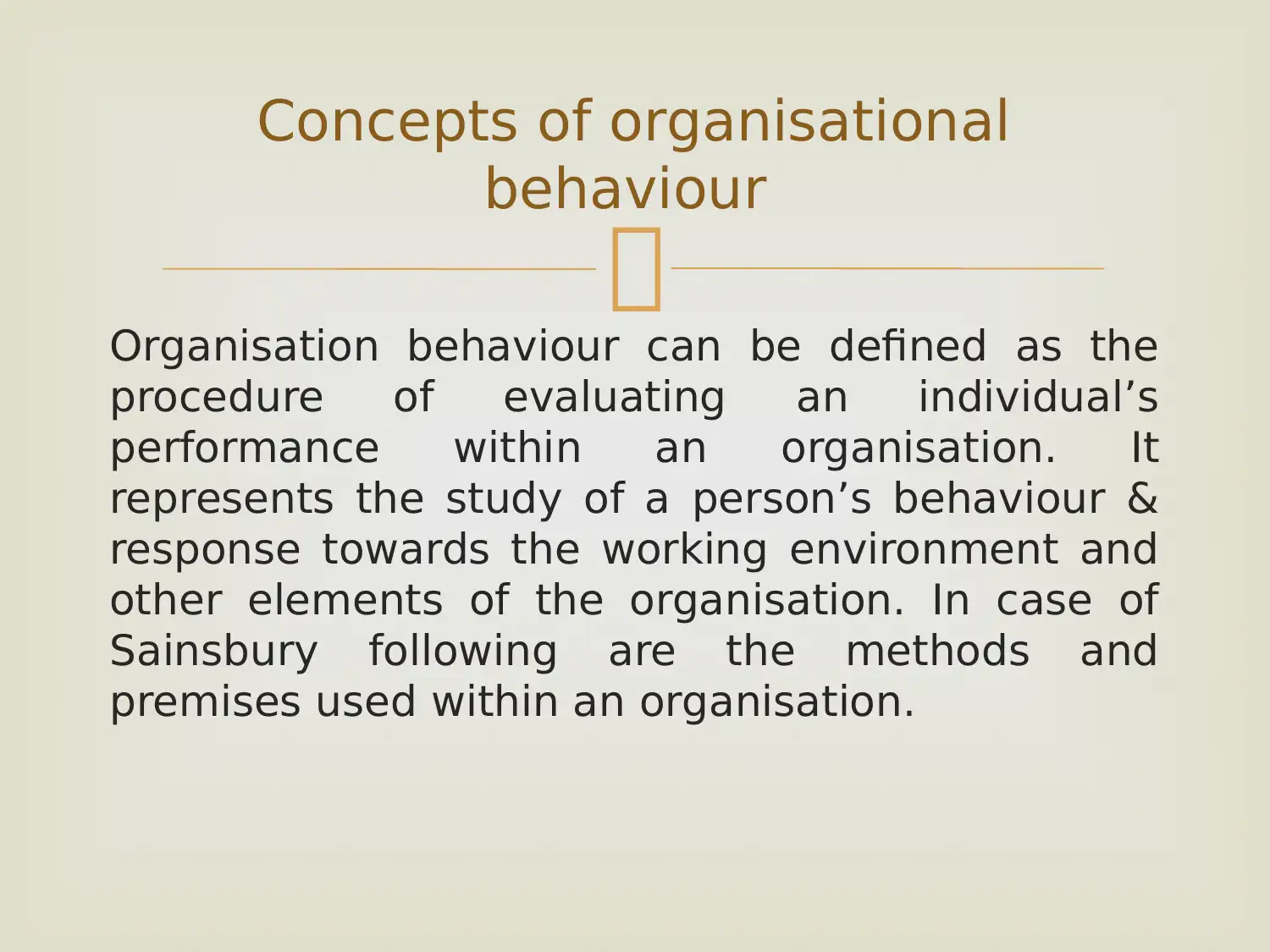
Organisation behaviour can be defined as the
procedure of evaluating an individual’s
performance within an organisation. It
represents the study of a person’s behaviour &
response towards the working environment and
other elements of the organisation. In case of
Sainsbury following are the methods and
premises used within an organisation.
Concepts of organisational
behaviour
Organisation behaviour can be defined as the
procedure of evaluating an individual’s
performance within an organisation. It
represents the study of a person’s behaviour &
response towards the working environment and
other elements of the organisation. In case of
Sainsbury following are the methods and
premises used within an organisation.
Concepts of organisational
behaviour
⊘ This is a preview!⊘
Do you want full access?
Subscribe today to unlock all pages.

Trusted by 1+ million students worldwide
1 out of 15
Related Documents
Your All-in-One AI-Powered Toolkit for Academic Success.
+13062052269
info@desklib.com
Available 24*7 on WhatsApp / Email
![[object Object]](/_next/static/media/star-bottom.7253800d.svg)
Unlock your academic potential
Copyright © 2020–2026 A2Z Services. All Rights Reserved. Developed and managed by ZUCOL.





